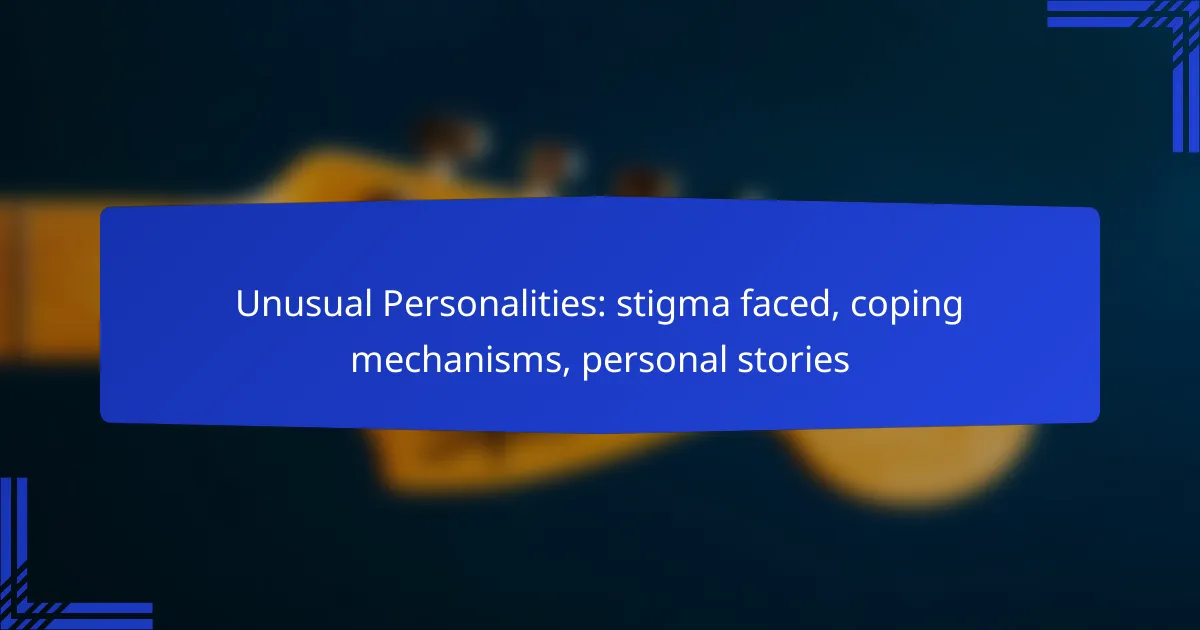Individuals with unusual personalities frequently face stigma that can lead to social exclusion and discrimination, impacting their emotional well-being and growth. To combat this, many develop coping mechanisms such as building supportive networks and practicing self-acceptance. Personal stories reveal how these strategies not only help in managing stigma but also inspire resilience in others facing similar challenges.

What stigma do unusual personalities face in Canada?
In Canada, individuals with unusual personalities often encounter stigma that manifests in social exclusion, workplace discrimination, and negative portrayals in the media. This stigma can lead to significant emotional distress and hinder personal and professional development.
Social isolation
Social isolation is a common challenge for those with unusual personalities in Canada. Many individuals find it difficult to connect with peers due to misunderstandings or preconceived notions about their behavior. This isolation can lead to feelings of loneliness and depression.
To combat social isolation, individuals can seek out communities or groups that embrace diversity and uniqueness. Engaging in activities that promote social interaction, such as clubs or volunteer work, can help build supportive networks.
Workplace discrimination
Workplace discrimination against those with unusual personalities is prevalent in Canada, where conventional norms often dictate professional behavior. Individuals may face bias during hiring processes or experience exclusion from team dynamics, which can limit career advancement.
To navigate workplace challenges, individuals should advocate for themselves by highlighting their unique strengths and contributions. Seeking out inclusive employers who value diversity can also enhance job satisfaction and career growth.
Negative media portrayal
The media often perpetuates negative stereotypes about unusual personalities, portraying them as eccentric or problematic. This portrayal can reinforce societal stigma and discourage individuals from expressing their true selves.
To counteract negative media influence, individuals can engage with platforms that celebrate diversity and promote positive stories. Sharing personal experiences through blogs or social media can also help reshape public perceptions and foster understanding.
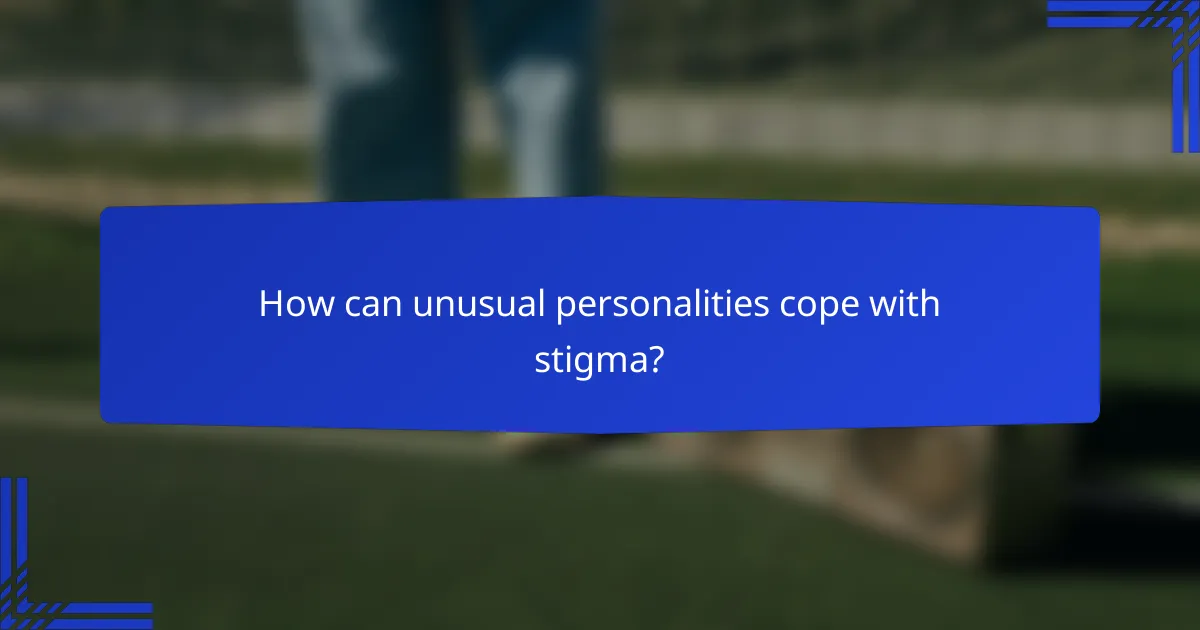
How can unusual personalities cope with stigma?
Unusual personalities can cope with stigma by developing strategies that foster resilience and self-acceptance. These strategies often include building supportive networks, practicing self-acceptance, and seeking professional help when needed.
Building supportive networks
Creating a supportive network is crucial for individuals with unusual personalities facing stigma. This can involve connecting with friends, family, or support groups who understand and accept their uniqueness. Engaging with communities, both online and offline, can provide a sense of belonging and validation.
Supportive networks can also offer practical advice and emotional support, helping individuals navigate social challenges. For example, joining local meetups or online forums focused on shared interests can help foster connections with like-minded individuals.
Practicing self-acceptance
Self-acceptance is a vital coping mechanism for those dealing with stigma. Embracing one’s unique traits and understanding that they contribute to individuality can enhance self-esteem. Individuals can practice self-acceptance through positive affirmations, journaling, or engaging in activities that highlight their strengths.
It may also be helpful to challenge negative thoughts and replace them with constructive ones. For instance, instead of focusing on perceived flaws, individuals can celebrate their unique perspectives and talents, reinforcing their self-worth.
Seeking professional help
Professional help can be a valuable resource for coping with stigma associated with unusual personalities. Therapists or counselors can provide tailored strategies and coping mechanisms to address feelings of isolation or anxiety. Cognitive-behavioral therapy, for instance, can help individuals reframe negative thoughts and develop healthier coping strategies.
In some cases, support groups led by mental health professionals can offer a safe space to share experiences and learn from others facing similar challenges. This collective approach can foster resilience and provide practical tools for managing stigma effectively.
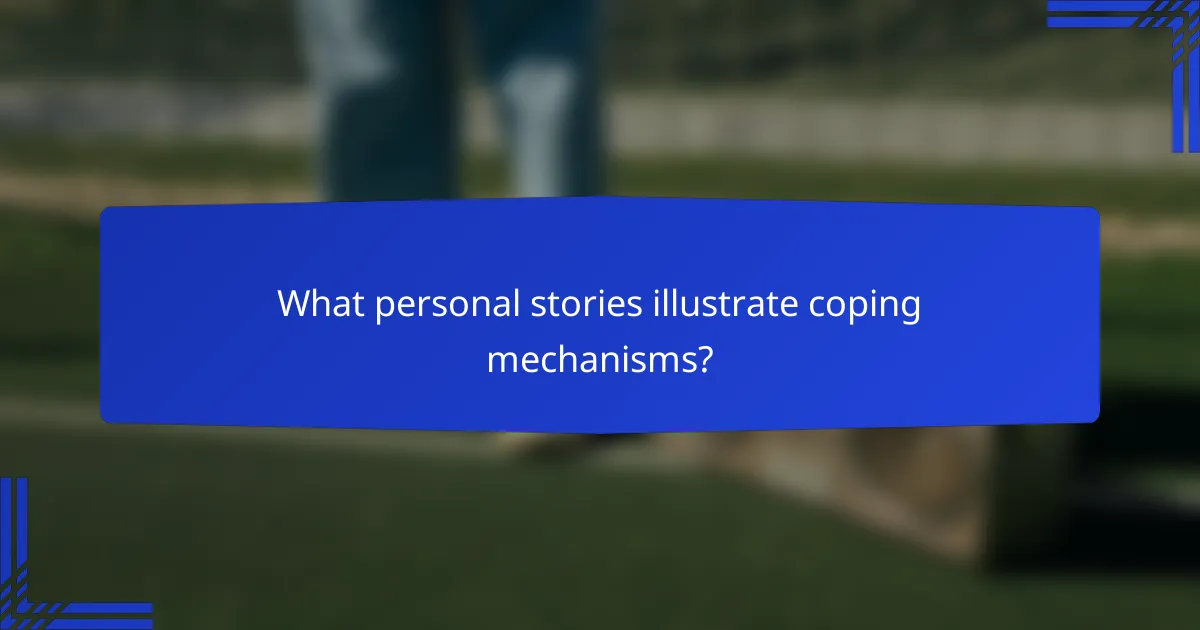
What personal stories illustrate coping mechanisms?
Personal stories often highlight effective coping mechanisms that individuals with unusual personalities employ to manage stigma and navigate their experiences. These narratives provide insight into resilience and practical strategies that can inspire others facing similar challenges.
Case study: Canadian artist’s journey
A Canadian artist faced significant stigma due to their unconventional style and approach to creativity. Initially, they struggled with self-doubt and isolation, but they began to share their work online, connecting with a community that appreciated their unique perspective. This shift not only boosted their confidence but also fostered a supportive network that encouraged collaboration and artistic growth.
Through workshops and exhibitions, the artist learned to embrace their individuality, using their platform to advocate for others with similar experiences. They often emphasize the importance of authenticity and self-expression as key coping mechanisms, reminding others that their differences can be a source of strength.
Testimonial: overcoming workplace bias
A professional in the tech industry shared their experience of overcoming bias related to their unusual personality traits. Initially facing skepticism from colleagues, they focused on demonstrating their skills through consistent performance and open communication. By actively seeking feedback and engaging in team projects, they gradually changed perceptions and built trust within their workplace.
This individual highlights the importance of resilience and adaptability in coping with workplace stigma. They recommend setting clear boundaries and finding allies who appreciate diverse perspectives, which can create a more inclusive environment. Their story serves as a reminder that persistence and a proactive approach can lead to positive change in professional settings.
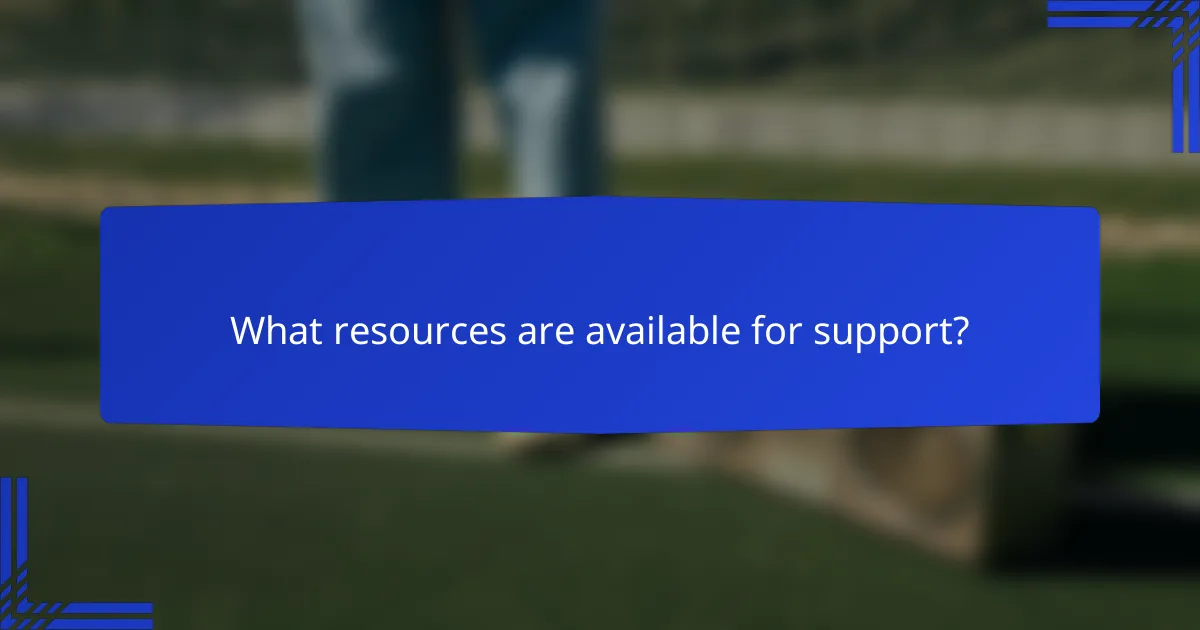
What resources are available for support?
Support resources for individuals with unusual personalities include local mental health organizations and online support groups. These resources provide essential guidance, community, and coping strategies to help navigate stigma and personal challenges.
Local mental health organizations
Local mental health organizations offer a range of services, including counseling, workshops, and support groups tailored to individuals facing stigma due to their unique personalities. Many organizations operate on a sliding scale based on income, making them accessible to a wider audience.
For instance, organizations such as the National Alliance on Mental Illness (NAMI) provide educational resources and peer support programs. Check for local chapters in your area, as they often host events and provide a safe space for sharing experiences.
Online support groups
Online support groups are a convenient option for individuals seeking community and understanding from the comfort of their homes. Platforms like Facebook and Reddit host various groups where members can share their stories, seek advice, and offer support to one another.
When joining an online group, look for those that are moderated to ensure a safe and respectful environment. Consider participating in groups that focus on specific aspects of unusual personalities, as this can lead to more targeted support and resources.
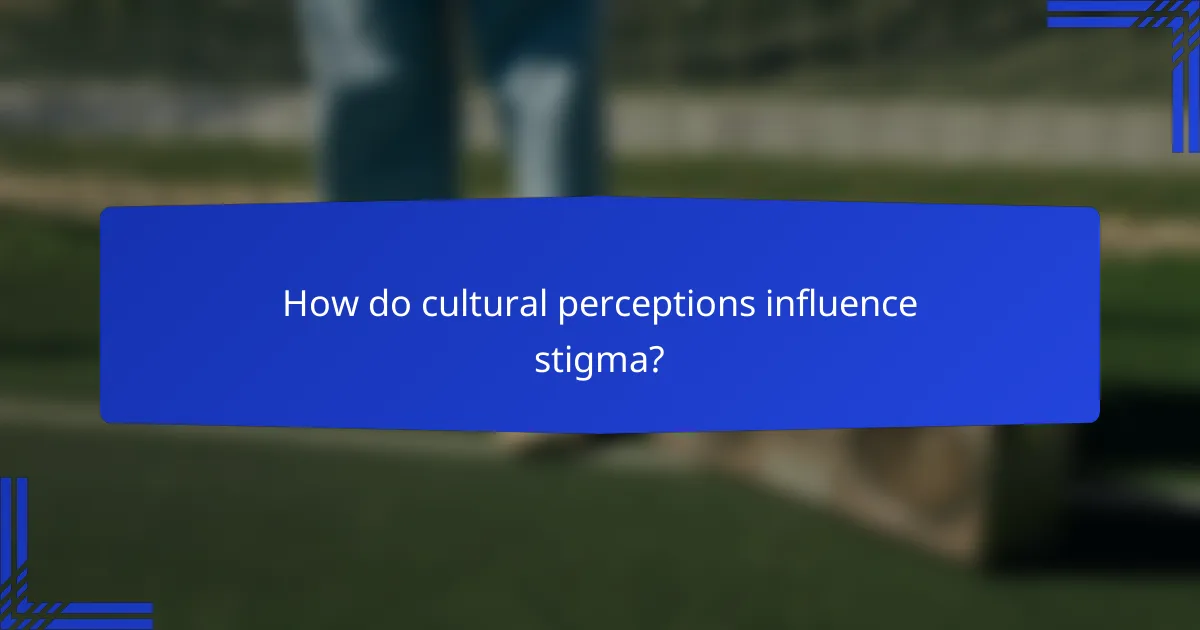
How do cultural perceptions influence stigma?
Cultural perceptions significantly shape the stigma faced by individuals with unusual personalities. These perceptions can dictate societal attitudes, leading to either acceptance or discrimination based on cultural norms and values.
Impact of Canadian multiculturalism
Canada’s multiculturalism promotes diversity and acceptance, which can reduce stigma associated with unusual personalities. In urban areas, individuals often encounter a blend of cultural perspectives that foster understanding and empathy.
However, even within this multicultural framework, some communities may still harbor biases. For instance, individuals from more traditional backgrounds might struggle to embrace differences, leading to varying experiences of stigma across the country.
Regional variations in acceptance
Acceptance of unusual personalities can vary significantly between regions. In larger cities like Toronto or Vancouver, diverse populations often create more inclusive environments, while rural areas may exhibit stronger adherence to conventional norms.
These regional differences can affect how individuals cope with stigma. For example, those in accepting areas might find supportive communities and resources, whereas individuals in less accepting regions may face isolation and limited access to help.
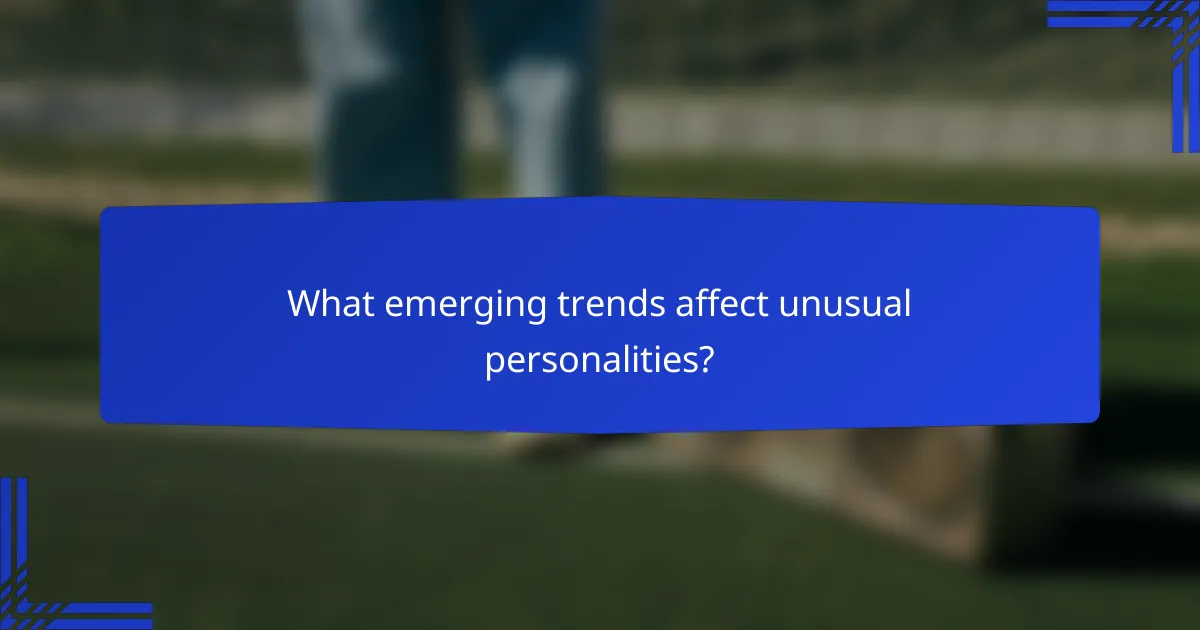
What emerging trends affect unusual personalities?
Emerging trends such as increased visibility through social media and shifts in workplace inclusivity policies are significantly impacting how unusual personalities are perceived and treated. These trends foster greater acceptance and understanding, while also presenting new challenges for individuals navigating their unique traits.
Increased visibility through social media
Social media platforms have become powerful tools for individuals with unusual personalities to share their experiences and connect with like-minded people. This visibility helps to normalize diverse traits and reduces stigma, as users can find communities that celebrate their uniqueness.
However, the same platforms can also expose individuals to negative feedback and cyberbullying. It is essential for users to curate their online presence and engage with supportive networks to mitigate these risks.
Shifts in workplace inclusivity policies
Many organizations are increasingly adopting inclusive policies that recognize and accommodate unusual personalities. These policies often include flexible work arrangements, mental health resources, and training programs aimed at fostering a more accepting workplace culture.
While these changes are positive, individuals should actively seek out companies that prioritize inclusivity during their job search. Researching a company’s values and employee reviews can provide insight into its commitment to supporting diverse personalities.
